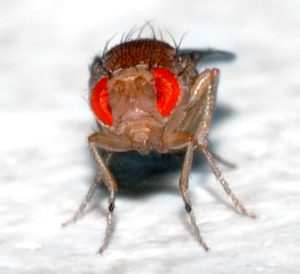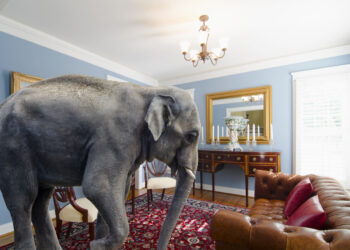
Amazon allows sellers to participate in the storefront, selling new and used items as an adjunct to Amazon’s main store.
Recently, Michael Eisen found a book on flies and genetics selling for a very high price — over $1 million. The book, “The Making of a Fly: The Genetics of Animal Design,” is apparently a classic in the field, but is now out of print.
It turns out that two sellers with new copies — one named “profnath” and other other “bordeebook” — were algorithmically matching each other’s prices. Profnath was selling at 99.83% of bordee’s price, while bordee was selling at 127% of profnath’s price. Here’s how the pricing escalated with these dynamics at work:
 On April 18th, the price spiked at $23,698,655.93, when profnath noticed and brought the price back down to $106.23 (which was promptly marked up by bordee to $134.97).
On April 18th, the price spiked at $23,698,655.93, when profnath noticed and brought the price back down to $106.23 (which was promptly marked up by bordee to $134.97).
As of this writing (April 23rd), the price was back up to $237.19.
It’s my hope that the author, Peter Lawrence, receives a share of whatever his book ultimately sells for.
Discussion
3 Thoughts on "Algorithmic Pricing on Amazon — Is a Book About Flies Worth $23,698,655.93 (plus shipping)?"
Hilarious! Dueling algorithms. This reminds me of computerized stock trading programs that precipitate market crashes, but without the dire consequences. Let’s hope it doesn’t happen with weapon systems. Or in my car.
More interesting to me in the article is the concept of the bookstore sans inventory. Set up an Amazon account, and copy other sellers’ listings plus a 20% premium. When an
order comes in, buy the book from another seller and quickly turn it around. Quite a way to implement a just-in-time supply chain cutting overhead costs.
Nothing too novel about that — bookstores have been selling non-inventory items for decades thanks to catalog systems from wholesalers.
I prefer the restaurant method of inventory management — make the food most likely to spoil into tonight’s “special.”
Or as Denny’s has done with its Maple Bacon Sundae, answering the age-old question (per Stephen Colbert), “What if we scrape the breakfast dishes into the freezer instead of the garbage?”



